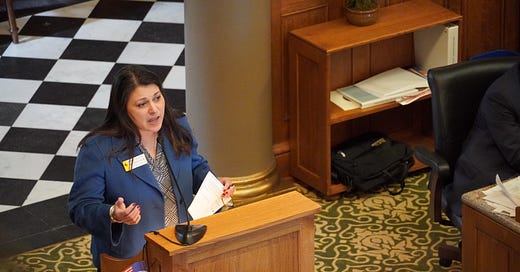‘Creative’ or ‘Unconstitutional?’: The proposal to elect UW trustees
House Bill 148 adds seven elected trustees to UW’s governing board. But some lawmakers fear the proposal violates the state constitution.
A proposal advancing through the Wyoming Legislature would double the number of voting members on the University of Wyoming Board of Trustees.
The seven current voting members are appointed by the governor. The seven additional seats added by the proposed bill would be elected positions, the individuals who fill them coming from across the state.
The problem? As opponents of the legislation see it, such a proposal is “on its face unconstitutional.”
During a Senate Education Committee hearing Monday, during which the bill was reviewed, detractors pointed to Article 7, Section 17 of the Wyoming Constitution, which states:
The legislature shall provide by law for the management of the university, its lands and other property by a board of trustees, consisting of not less than seven members, to be appointed by the governor by and with the advice and consent of the senate, and the president of the university, and the superintendent of public instruction, as members ex officio, as such having the right to speak, but not to vote. The duties and powers of the trustees shall be prescribed by law.
Whatever else it requires, the language of this section clearly establishes that the governor must appoint seven voting members to the board. That is why HB148’s sponsor, Cody Rep. Rachel Rodriguez-Williams (HD-50), drafted the bill to add seven elected members to the seven appointed members rather than simply replacing the appointed members with elected ones.
“It’s a perfect way to maintain the structural status quo while expanding public access to the university’s governing authorities,” she said. “This is clearly just a creative way to provide an additional option for our communities.”
Rodriguez-Williams said giving Wyomingites that “additional option” is necessary because her constituents are wary of the university and want more say in its governance.
“I would say there is a sense of disappointment in the management of [or] the way that our university is reflected statewide,” she told the committee. “I would say there’s a sense of reluctance to send students to our only land-grant university because of some of the issues that are portrayed.”
Rodriguez-Williams did not elaborate on the nature of these “issues,” but the Freedom Caucus she leads has been pushing to ban diversity-oriented programs at UW, while its allies have taken aim at course curriculum. Conservative lawmakers are also attempting to ban transgender athletes from competing for UW and prohibiting UW itself from competing against any other school more inclusive of transgender athletes.
Casper Sen. Charles Scott (SD-30) is a proponent of the push against DEI at UW and has voted in favor of numerous anti-trans bills. But he took issue with Rodriguez-Williams’ bill, calling it “on its face unconstitutional.”
“This bill, as it stands before us, is not and cannot be made constitutional,” Scott said.
At issue is the language of the constitution itself, which calls for UW to be led by:
... a board of trustees, consisting of not less than seven members, to be appointed by the governor and with the advice and consent of the senate, …
Scott said that language clearly limits the voting members of the board to those appointed by the governor. This is an interpretation shared by the governor’s office.
Drew Perkins, Gov. Mark Gordon’s chief of staff, testified to the Senate Education Committee Monday, outlining — literally — the letter of the law.
He said the constitution states UW will be run by “not less than seven trustees” and clarifies that those trustees be appointed by the governor and approved by the senate. Perkins said the law doesn’t allow for the addition of more voting members.
“Simply, Article 7, Section 17 is pretty clear,” Perkins said. “The fact you have those two commas [bookending the phrase “to be appointed by the governor by and with the advice and consent of the senate”] means that relates to both antecedent clauses.”
If adding elected trustees is unconstitutional, that doesn’t mean it can never happen in Wyoming. But it would require a constitutional amendment that would have to go before voters during an election. That’s a much higher bar.
“Not running a constitutional amendment here,” Rodriguez-Williams told the committee. “I’m not interested in that. Just looking for further representation of the people across the state and giving the opportunity for communities to provide elected positions similar to the concept of our community colleges.”
Driven by these concerns about constitutionality, the committee refused to endorse the bill, voting 3-2 to recommend the full Senate not pass it.






Once again the Freedom Caucus openly disregards the Wyoming Constitution. Can they not read?
Can only imagine what Rachel's constituents think should happen at UW. Bigger question is how many of them have even attended college and specifically UW.